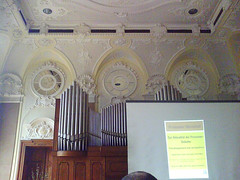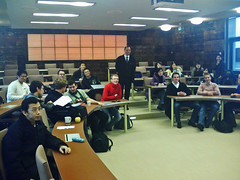Frankfurt.
The next speakers here at Prosumer Revisited are Matthias Bode and Per Østergaard, whose interest is in consumption studies. How do consumers relate to culture, products and brands, companies, and each other - and where does the idea of the prosumer fit in here? They begin by noting the idea of integrating consumers into the production sphere in order to make production more democratic as well as to make production more profitable.
How can different conceptual approaches to the consumer be mapped? One approach is to map them across the micro-macro continuum. On the macro level, the term is used to refer to a kind of social revolution in late capitalism, but also to the potential for exploiting consumers by involving them in production processes; on the micro level, it is used more anecdotally to refer to examples and symptoms of such changes, but without enough broader conceptual support. From a marketing perspective, at the micro level there is interest in developing new revenue models and changing relationships between companies and customers, while at the macro level there is a focus on the co-creation of meaning.














